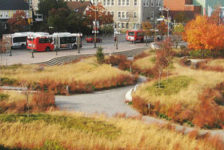We take a look at how the 7 deadly sins can be applied to new landscape architects. “There is a charm about the forbidden that makes it unspeakably desirable,” – if you are familiar with that famous saying by Mark Twain, perhaps you have also heard about the classification of vices concerning humans’ weakness to sin. That’s right, what we’re talking about is the seven cardinal, mortal, deadly sins. From Dante’s medieval epic poem the Divine Comedy to David Fincher’s sensational 1995 movie entitled Seven (SE7EN), the theme of the seven deadly sins has been a great source of inspiration to artists and writers all over the world and throughout the course of time. Landscape architects, too, are authors and artists. But most primarily, they are humans as well. How do the 7 deadly sins look from young landscape architects’ point of view? What are the sins new professionals commit? And which are the antidotes fighting those vices? Satisfy your curiosity by reading the intriguing lines below.
1. Lust
The first mortal sin, lust, is associated with an overwhelming, uncontrolled desire. According to Oxford Learner’s Dictionaries, lust is defined as “very strong desire for something or enjoyment of something.” That interpretation can include an intense desire for power, money, or fame, for example. So what does lust look like in the eyes of a recent landscape architecture graduate? Imagine yourself at the finish line of university. Only your graduation work stands in your way to the beginning of a meteoric career. You are eager, enthusiastic, and determined about your future. The problem, however, occurs when expectations and reality collide. Your extreme desire to find a brilliant job may meet a long, exhausting, discouraging period of search for that job. Sometimes it just takes more time than you expected. Of course, you may find a decent job quickly, but will your requirements match the conditions you’re given?

“Lujuria Lust Pecado Original (3969921829)” by Gabriel S. Delgado C. from Puerto Ordaz, Venezuela – Lujuria / Lust: Pecado OriginalUploaded by Fæ. Licensed under CC BY 2.0 via Wikimedia Commons
2. Gluttony
The second deadly sin, gluttony, stands for “habitual greed or excess in eating” after Oxford dictionaries’ definition. Gluttony also refers to overindulgence and selfishness.

“Gluttony” by Hannah Farsi. Licensed under CC BY 2.0 via Flickr
3. Greed
The third place in the list of sins is saved for greed, the “intense and selfish desire for something, especially wealth, power, or food,” as Oxford Dictionaries explain. Greed is mainly related to excessive pursuit of material possessions or the desire to possess more than you need. How does greed apply to new landscape architects? It was already mentioned that green professionals are often tempted to chase higher incomes, more clients, power and reputation. And although it’s good to be ambitious, being greedy is a completely different story. Damage to your reputation is the least harm greed can do. Good deals and loyal clients come in time, gradually but steadily. So don’t walk into greed’s trap. You don’t want to step into the world of professionals in a wrong way – be loyal to colleagues, to clients, and to yourself. As Will Rogers has said, “You never get a second chance to make a first impression”; so don’t waste it!

“Greed” by Liz West. Licensed under CC BY 2.0 via Flick
4. Sloth
Right in the middle of the sinful roll call, we find sloth. “Reluctance to work or make an effort; laziness,” is how Oxford Dictionaries define sloth’s meaning. When we talk about young professionals, sloth may be quite a dangerous trespass. Leaving the university’s secure capsule may be exceptionally stressful to young people. The change is really huge when you realize that you have spent five years with the set purpose of graduating, and in the next moment – you’re out of college’s world. Most students take a period of rest after graduating which, if underestimated, may last longer than needed. If it’s accompanied by fear of the unknown, there is a great chance you will find yourself in a vicious circle of apathy, inertness, and indolence. So be careful and don’t underrate that transitional period. Set your new aims, mobilize and find the satisfaction of diligence again, in the next stage of your life.
5. Wrath
The fifth mortal sin is presented by wrath, the “extreme anger” as Oxford Dictionaries suggest. Anger, rage, fury, annoyance and indignation are some of the synonyms related to that sin. Wrath can also take the shape of impatience and self-destructiveness. In which cases do young landscape architecture professionals feel wrath? Finding a job that doesn’t satisfy your criteria or seeing that some of your colleagues are stimulated better than you at work without any particular reason are just some of the possible situations. Doing your best to impress your boss but not receiving any attention, or one of the worst scenarios – not even getting a chance to start working where you wished – are two more reasons for wrath to creep into your mind.

Licensed under CC BY 0.0 via Pixabay
6. Envy
Getting closer to the end of our list, we reach envy. The definition given by Oxford is “a feeling of discontented or resentful longing aroused by someone else’s possessions, qualities, or luck.” Envy is often relevant to jealousy as well, as they’re both characterized by discontent towards someone’s status, awards, abilities or traits. How is envy embodied through the eyes of a young landscape architect? New professionals are frequently quite dazed and disoriented at the starting point of their career. They are impatient and are often in a hurry to succeed. And honestly, some get luckier than others in finding their dream job. One more precondition for envious emotions is when some of your colleagues achieve more than you at work. Last but not least, some of the green landscape architects may jump into envy’s trap by trying to copycat some more experienced designers. Plenty of opportunities can make you envy’s prisoner, but the way to escape that prison is only one. Focus on yourself, work for your own achievements, and seek a kind attitude. Kindness is the nostrum.
7. Pride
The last deadly sin, which is also believed to be the greatest and the origin of all the other sins, is pride. According to Oxford Dictionaries, pride is ”a feeling of deep pleasure or satisfaction derived from one’s own achievements, the achievements of one’s close associates, or from qualities or possessions that are widely admired.” For young specialists, pride is a good quality to possess, as long as it doesn’t reach unlimited dimensions. But assuming for even one second that you are a finished landscape architect who doesn’t have an Achilles’ heel is the turning point of pride prevailing over you. It’s awesome to be proud of yourself after graduating such a vast, complex discipline as landscape architecture, but truth be told, it’s almost impossible to conquer the world armed only with a diploma.

“PikiWiki Israel 32767 Proud peacock” by שמוליק שחר – shmuel shahar via the PikiWiki – Israel free image collection project. Licensed under Public Domain via Wikimedia Commons
- Urban Design by Alex Krieger
- The Urban Design Handbook: Techniques and Working Methods (Second Edition) by Urban Design Associates
Article by Velislava Valcheva Return to Homepage
Published in Blog








